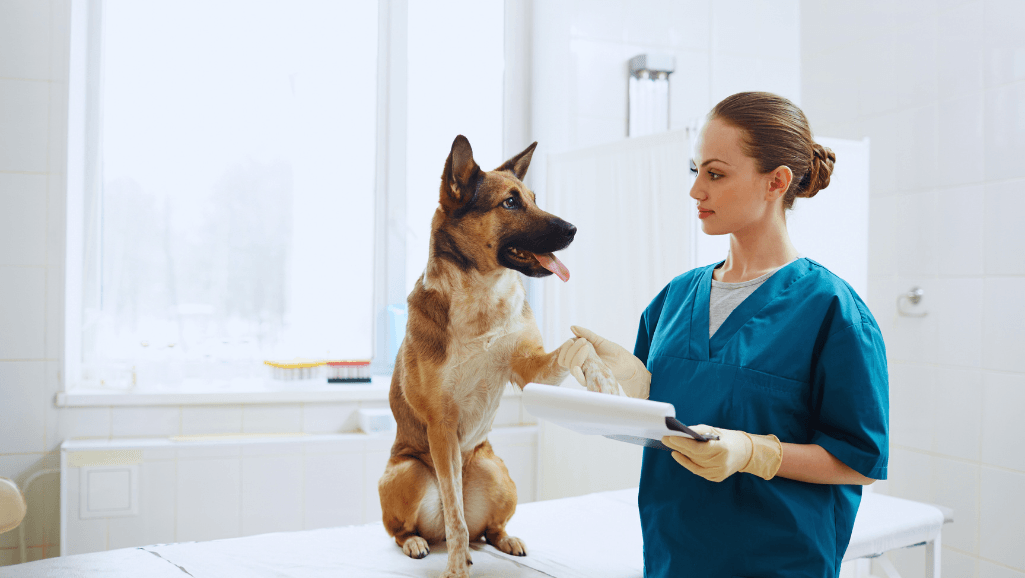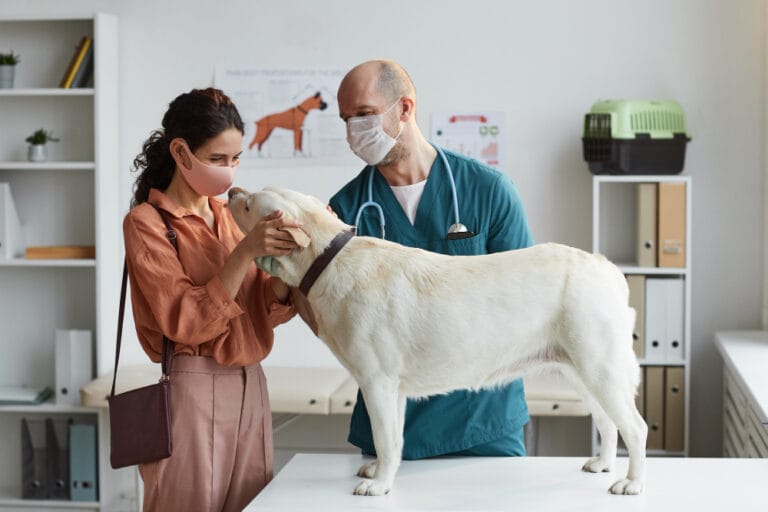As a dog owner, keeping your pet healthy is key. Ear infections are common, affecting up to 20% of dogs. These can cause pain and serious problems if not treated quickly. It’s vital to get treatment fast to help your dog feel better.
Dogs get ear infections for many reasons. Some breeds, like Basset Hounds and Cocker Spaniels, are more at risk. Swimming or bathing can also lead to infections because of moisture in the ears.
To treat your dog’s ear infection, knowing the type and where it is is important. Otitis externa, affecting the outer ear, is common. Symptoms include redness, swelling, and a bad smell. Your vet will diagnose and suggest the right medicine, like antibiotics, based on the cause.
Key Takeaways
- Dog Ear Infection Treatment.
- Ear infections are prevalent in dogs, with certain breeds being more susceptible.
- Prompt treatment is essential to alleviate symptoms and prevent complications.
- Identifying the type and location of the infection is crucial for effective treatment.
- Dog ear infection medication may include antibiotics, antifungals, or other targeted therapies.
- Regular ear cleaning and maintaining a dry environment can help prevent future infections.
Understanding Dog Ear Infections
Dog ear infections are a common health issue for pets. They cause discomfort and distress. It’s important to recognize the signs and symptoms early for treatment and prevention.
Common Symptoms of Dog Ear Infections
Knowing the symptoms of ear infections in dogs is key. Some common signs include:
- Excessive scratching or pawing at the ear
- Head shaking, particularly when it appears awkward or unnatural
- Dog ear swelling and redness around the ear canal
- Unusual dog ear discharge and dog ear odor
- Scabs or crusted skin inside the ear
- Dog ear inflammation and sensitivity to touch
If you see any of these symptoms, see your vet for help.
Types of Dog Ear Infections
There are three main types of ear infections in dogs:
- Otitis externa: This affects the outer ear canal. It’s often caused by bacteria, yeast, or ear mites.
- Otitis media: This affects the middle ear canal. It often comes after otitis externa.
- Otitis interna: This is an inner ear infection. It can cause serious neurological damage if not treated.
Early detection and treatment of ear infection symptoms in dogs are crucial for preventing the progression of the infection and minimizing the risk of complications.
By knowing the symptoms and types of dog ear infections, you can keep your pet’s ears healthy. This ensures they get the right treatment when needed.
Causes of Dog Ear Infections
Many things can cause dog ear infections. These include the dog’s ear shape, where they live, and their health. Knowing what causes these infections helps us treat and prevent them in dogs.
Anatomical Factors
Dogs’ ears are shaped differently than humans’. Their L-shaped ear canal traps fluid. This makes it easy for bacteria, yeast, and mites to grow. Dogs with long ears, like spaniels, are more likely to get chronic infections.
These infections can even lead to otitis interna.
Environmental Factors
Moisture is a big problem for dog ears. Dogs who swim or get their ears wet often are more likely to get infections. This is because moisture helps bacteria and yeast grow.
To keep your dog’s ears dry, dry them well after swimming or baths. Also, keep their ear area clean and dry.
Underlying Health Conditions
Some health issues make dogs more likely to get ear infections. Allergies are a big reason for recurring infections. Both environmental and food allergies can cause problems.
Dogs with weak immune systems, like those with hypothyroidism or Addison’s disease, are also at risk. If your dog keeps getting ear infections, see your vet. They can help find and treat any health issues.
The most common underlying cause of recurring ear infections in dogs is allergies.
Understanding why dogs get ear infections helps us prevent and treat them. This includes knowing about ear shape, environment, and health issues. By taking action, we can keep our dogs happy and healthy.
Diagnosing Dog Ear Infections
If you think your dog might have an ear infection, it’s important to see a vet. Up to 20% of dogs get ear diseases, with otitis externa being the most common. This affects the outer ear canal.
Your vet will ask about your dog’s symptoms. They might ask about scratching, shaking, smelly discharge, redness, and heat in the ear. They’ll also ask which ears are affected and if your dog has any neurological issues.
They will use an otoscope to look into the ear canal. This helps them check for foreign objects and the ear drum’s condition.
To find out why your dog has an ear infection, your vet might do more tests. These tests can show if there are harmful microorganisms like yeast, bacteria, or parasites. Dark discharge often means a yeast, ear mite, or bacterial infection.
In some cases, your vet might do allergy tests, ringworm tests, biopsies, or X-rays. These help find the main reasons for the ear inflammation.
Identifying all the causes of otitis externa is crucial for successful treatment.
Middle and inner ear infections, known as canine otitis, can cause serious symptoms. These include head tilt, vomiting, loss of balance, and deafness. Your vet will need to do a detailed check and might use more tests to diagnose and treat your dog correctly.
Dog Ear Infection Treatment
Getting your dog’s ear infection treated right is key for their happiness and health. After your vet finds out what kind of infection it is, they’ll make a special plan. This plan usually includes cleaning your dog’s ear well to get rid of dirt, discharge, and wax. They might use a special ear cleaner or cream.
Immediate Care
If the infection is bad, your vet might give your dog medicine to ease pain and swelling. This can include antibiotics or anti-inflammatory drugs. These help your dog feel better and fight off the infection. Common medicines include Augmentin, Enrofloxacin, and Cephalexin.
Long-Term Care
For keeping the infection away for good, your vet might give your dog ear drops or ointments. These have antibiotics, antifungals, and anti-inflammatories to fight the infection. Some popular ones are Mometamax and Otomax.
Most ear infections in dogs happen in the outer ear canal, says the Merck Veterinary Manual. They can be caused by allergies, ear mites, or too much cleaning. Quick action is important to stop it from getting worse.
Topical Medications
When using ear drops, follow your vet’s advice closely. Clean your dog’s ears first and make sure the drops cover the ear canal. Being consistent is important to help your dog get better faster.
Oral Medications
Your vet might also give your dog medicine to take by mouth. This can include antibiotics, antifungals, and pain relievers. Common ones are Sporanox and Galliprant. Always finish the medicine, even if your dog seems better, to make sure the infection is gone.
Treating dog ear infections can be expensive, especially if they happen again. Talking about costs with your vet is important. Pet insurance can help with the costs. With the right care, most dogs can get better and live happily again.
Home Remedies for Dog Ear Infections
Home remedies can be a safe and effective way to treat dog ear infections. They can help soothe your pet’s discomfort and fix the problem. Adding these remedies to your pet’s care can help them heal and prevent future infections.
Cleaning Your Dog’s Ears
Keeping your dog’s ears clean is key to preventing infections. Use a pet-specific ear cleaning solution. Gently wipe the outer ear with a soft gauze, avoiding the inner ear. Don’t use cotton swabs, as they can hurt or make the infection worse. Clean your dog’s ears once a week or as your vet advises.
Natural Remedies
Experts recommend several natural remedies for dog ear infections. These include:
- Green tea: Its antimicrobial properties can fight infections. Soak a green tea bag in warm water, cool it, and apply it to your dog’s ear with a clean gauze.
- Calendula: This herb has anti-inflammatory and healing properties. Mix a few drops of calendula tincture with warm water and clean your dog’s ears with it.
- Grapefruit seed extract: It has antifungal and antibacterial properties. Dilute it with water and use it as a natural ear cleaning solution.
- Oil of oregano: This essential oil has strong antimicrobial properties. Mix a few drops of oil of oregano with coconut oil and apply it to your dog’s ear infection.
- Apple cider vinegar: Its acidity can help balance your dog’s ear pH, preventing harmful growth. Mix equal parts water and apple cider vinegar for cleaning.
Always talk to your vet before using natural remedies for dog ear infections. They can guide you on the right dosage and application. Be careful with essential oils, as they can irritate if not diluted correctly.
Maintaining a healthy diet, minimizing chemical exposure, using natural supplements, and reducing conventional medication use are key to preventing dog ear infections.
By using these home remedies and focusing on prevention, you can help your dog feel better and keep their ears healthy. If your dog’s ear infection doesn’t get better or gets worse, seek vet care for proper treatment.
Preventing Dog Ear Infections
Keeping your dog’s ears healthy is crucial. Simple steps can help prevent ear infections. One in five dogs gets ear disease, with ear infections being a big part of vet visits in warm months. Breeds like Labs are more likely to get ear infections because of their ear shape.
Regular Ear Cleaning
Regular ear cleaning is key to preventing infections. Dogs need their ears cleaned monthly, more often if they’re prone to problems. Use a vet-recommended solution, massage, and wipe with cotton pads.
Do this every 1-2 weeks. It keeps ears clean and stops bacteria and yeast from growing. These thrive in warm, moist places.
Maintaining a Dry Environment
Keeping ears dry is also important. After swimming or baths, dry your dog’s ears well. Use a soft towel to dry the inner folds and crevices.
Cotton balls, doggie snoods, or hoods can also help keep water out during baths or swims.
Addressing Underlying Health Issues
Some health issues can make dogs more likely to get ear infections. Allergies, thyroid problems, and immune system issues are examples. If your dog keeps getting ear infections, see your vet.
Your vet might suggest supplements, special diets, or treatments. These can help your dog’s health and reduce ear infection risk.
Remember, prevention is always better than cure when it comes to your dog’s ear health. By incorporating regular ear cleaning, maintaining a dry environment, and addressing any underlying health concerns, you can help ensure your furry companion’s ears remain healthy and infection-free.
When to Seek Veterinary Care
If your dog shows signs of ear discomfort, like shaking their head or pawing at their ears, get vet care fast. Mild ear infections might be treated at home, but severe ones need a vet’s help. A vet specializing in dog ear infections is the best choice.
Vets can find out why your dog’s ears are infected. They might check for allergies, yeast, or bacteria. They’ll do a full exam, take ear swabs, and send them to the lab if needed. This way, your dog gets the right treatment.
For serious or ongoing infections, your vet might give ear drops, ointments, or antibiotics. They might also suggest an Elizabethan collar to stop your dog from scratching their ears. This helps the infection heal faster.
Remember, delaying treatment for a dog ear infection can lead to more severe complications and prolong your pet’s discomfort. If you suspect your dog has an ear infection, don’t hesitate to schedule an appointment with your veterinarian to get them on the path to recovery.
If your dog often gets ear infections, regular vet visits are key. Your vet can help you prevent future infections. This might include weekly ear cleanings and quick treatment when an infection starts. Sometimes, your vet will send you to a specialist for advanced care.
By following your vet’s advice and treatment plan, you can help your dog feel better. A healthy ear canal is important for your dog’s happiness and health.
Conclusion
Caring for our dogs means being alert and quick to act when they get ear infections. Knowing the reasons, signs, and treatments for dog ear infections helps us give them the best care. Home remedies and prevention can help with mild cases. But, it’s important to see a vet for serious cases.
Early action is crucial to avoid bigger problems and cure ear infections. Regular vet visits, keeping ears clean and dry, and fixing health issues are key. If you think your dog has an ear infection, see your vet right away for the right treatment.
Being informed and working with your vet can help your dog beat ear infections. With love, care, and quick medical help, your dog’s ears will stay healthy and happy. This way, your dog will always be ready to listen to you.
























